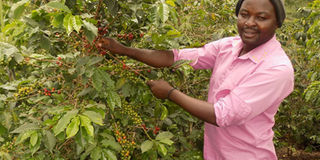Bakunda pockets Shs10m from coffee

Robert Bakunda owns a coffee factory that employs more than 10 youth.
What you need to know:
- With only Shs100,000, Robert Bakunda, a coffee trader and grower started his business of buying coffee from farmers in Kamwenge District. Joseph Kato finds out how he has boosted the coffee farmers’ income.
Considering that the economy is not doing well, if one handed another Shs100,000 to start a business, it might be rubbished as little. But for Robert Bakunda, a 29-year-old coffee trader and grower, that was just what he needed.
How he started
At 17, Bakunda dropped out of school due to financial challenges. He soon found his way by doing casual jobs where he raised Shs100,000. This money was invested into coffee in Kitagwenda, Kamwenge District where he planted 200 coffee trees.
Bakunda moves on a bicycle in villages buying coffee either with cash or on credit.
In three years, Bakunda’s capital has risen to Shs3m. In the fourth year into the coffee business, Bakunda used part of the profits he had accumulated to buy four acres of land where he grew Arabica coffee.
“I realised there was need to increase my coffee business by producing my own. Besides, I wanted to have coffee gardens that I would use to educate farmers on pre and post-harvest handling,” Bakunda says.
Bakunda’s coffee plantation has not disappointed him. He harvests between 700 and 900kg per acre that are then sold at Shs3,000 per kilogramme. Averagely, he harvests 3,500kg from a four-acre plot, bagging Shs10.5m per season.
The dark-skinned Bakunda says coffee prices are unstable between Shs3,500 and Shs4,500.
Operational costs
Concerning operational costs, he says: “When I get the money from selling my coffee, I deduct what I spent on purchasing agro-inputs which rise to about Shs3m. I use part of the profits to cater for my family and reinvest the rest,” he stresses.
He sells a kilogramme of dry coffee at Shs3,000 because the farmers have not embraced good agriculture practices. Sometimes, they sell him coffee mixed with animal droppings, soil and stones.
This has forced him to collaborate with other agronomic experts such as USAID Feed the Future Marketing and Crop Production Activity to train farmers.
Bakunda and Arthur Tumwebaze, a coffee farmer, decided to conduct village-to-village sensitisation programmes on pre and post-harvest coffee handling.
As Bakunda’s output and profits accumulated, he has started a coffee factory. The factory he estimates to have cost him more than Shs20m is now an employer of more than 10 youth. He feeds the factory with the coffee he buys from over 185 farmers under his mentorship and from the 120 farmers under Tumwebaze leadership.
Even though Bakunda had started his own factory in 2014, his main challenge was getting reliable buyers for the pulped coffee.
With the good harvests from his coffee gardens and increased production from farmers, Bakunda shifted from selling his coffee to mobile buyers and started trading with Kitagwenda Zonal Coffee Farmers Association. This, he says, has saved him from being cheated by middle men.
Mr Samuel Kabachenga, the chairman of Kitagwenda Zonal Coffee Farmers Association, applauds Bakunda saying his membership has grown the association’s 17 tonnes to 25 tonnes of coffee.
“Bakunda teaches farmers how to prepare gardens, plant, weed, and dry their coffee. Such had been long standing huddles in our coffee production chain. Nowadays the quality of our farmers’ coffee has improved,” Kabachenga says.
Tips for success
Bakunda says: “An entrepreneur should know the brand of the business. He or she also needs to maintain a good relationship with customers.
Citing honesty as a tool that has helped him excel, he says any businessperson who shuns honesty sets himself as a failure.
“I used to get coffee on credit because people trusted me. I ensure I pay all farmers who trade with in time because they also have responsibilities.”
People uplifted by Bakunda’s coffee business
Robert Bakunda owns a coffee factory that employs more than 10 youth.
“Bakunda is one person who does not disappoint on his assignments and promises. We encourage the leaders of the seven farmers’ societies under our association to produce good quality coffee and Bakunda has maintained the quality. He has taught many farmers on good agriculture practices and many youth have grown coffee because they admire him,”
Samuel Kabachenga, chairman Kitagwenda Zonal Coffee Farmers Association
“Bakunda has advised our association to start up a farmers’ Sacco within our association and it is something we hope to start soon. Bakunda is a man of great ideas. His ideas have contributed to the growth of our association. I also plan to start up a factory in my area to help to add value to our coffee,”
Arthur Tumwebaze, Kantonzi Cooperative Union




